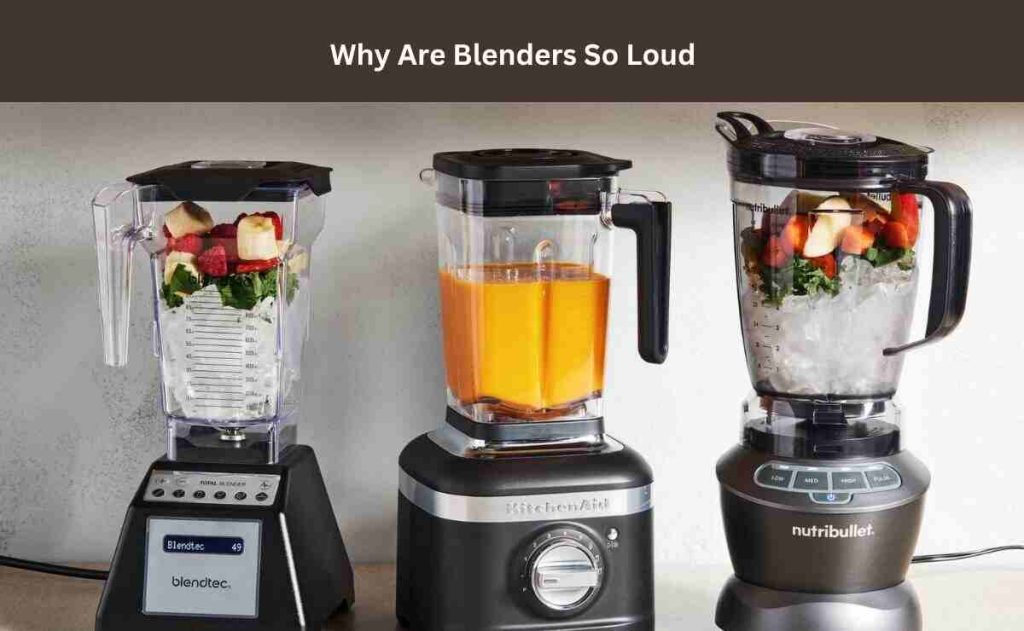Some blenders produce so much sound that it can even wake everyone up in the house. But does that mean that there’s something wrong with your blend? Necessarily not. So, why are blenders so loud?
Blenders are loud because they use powerful motors. The powerful motor in a blender creates a lot due to the speedy rotation. Also, the air that moves due to the speed adds up to the noise level.
No blender is made in a way to be completely silent, but you can definitely take some measures towards managing the sound. Today, we have got everything about it right in place!
13 Reasons Why Are Blenders So Loud

If you are wondering where all these noises are coming from, it’s probably the powerful motor of your blender. However, there are a few reasons behind your blender being so loud. Such as:
- Powerful Motor: The main reason why blenders make so much sound is because of the powerful motor inside them. They use extra-powerful motors to chop, blend, and puree ingredients. Thus, it creates a lot of noise while rotating at high speeds.
- Air Movement: Due to the speedy movement of the blades, the air also moves rapidly. This can create a whirring or buzzing sound that adds to the overall noise level.
- Container Size: Large blenders create more noise as the space allotted is bigger so there’s more air for the sound waves to travel.
- Blade Material: Depending on the blade’s material, the blenders may produce more or less sounds. Blenders made with hard materials tend to make way more sound than plastic blades.
- Blender Orientation: If you have put together the blender in the wrong way, it may create awful noise until you fix it. That’s why it’s important to always ensure the proper alignment of the blender’s components.
- Blade Quality: Dull blades make more noise than sharp blades because they need to give more effort to cut the items. So, when your blender has served you for a while, the noise might be due to the blade’s dullness.
- Blade Size: Longer blades usually create more sounds than shorter blades as they can operate more efficiently.
- Air Flow: The air flow around the blades and the space allotted put an impact on the sound level. When the container is big, there can be adequate airflow so the sounds will increase. Whereas, small blenders don’t make that much noise.
- Speed Settings: The noise level of a blender can vary depending on the speed setting used. If you are using the highest setting, the noise will increase compared to the lowest speed setting.
- Voltage: Blenders that use a higher voltage to operate make more noise than blenders that use a lower voltage to operate. Also, if the voltage of your house is high, the blender may suddenly create an increased sound.
- Sound-Dampening Materials: Some blenders lack sound-dampening materials. So, if your blender doesn’t include one, it may make more sound than usual.
- Blender Placement: The sound level also depends on the area you put your blender in. If you keep it in a hollow place, the sound will sound extreme compared to a busier area.
- Type of Ingredients: The noise level of the blender can also be affected by the type of ingredients being blended. Hard or frozen ingredients produce more noise than soft ingredients.
How Loud Is A Blender?
The loudness of a blender can vary depending on several factors. Usually, high-end blenders like, Vitamix Propel Series 750 Blender, make less noise than cheaper ones. Typically, a blender produces noise levels of around 80-90 decibels, which is equivalent to the noise level of a vacuum cleaner or a power drill.
However, if you want a decreased noise level, you can go for the high-end blenders. The noise level for high-end ones is around 60-70 decibels, which is less noisy but still audible.
Why Are Some Blenders So Much Louder Than Others?
Some blenders are louder than others due to several factors, including the design of the blender, the power of the motor, and the type of materials. Blenders that use a higher wattage to operate make more noise than the ones that don’t.
Due to the extra power usage, higher voltage usage may contribute to the noise level. Besides, the shape, angle, and size of the blender blade can affect the amount of noise produced. Your blender’s material also contributes to the noise. Blenders with glass jars tend to be quieter than the other ones.
Again, blenders that have fans or vents help to circulate air and prevent overheating, but these can also contribute to increased noise. Moreover, when you have used the blender for quite a while, this may also increase the noise level.
Tips To Make A Blender Run More Quietly
Blender’s noise can easily irritate you if you need to use it for an extended period. So, here are a few tips that might help:
- Use A High-End Blender: The noise level for high-end blenders are lower than the cheaper ones. So, if you spend a few more bucks, you can get rid of the extra noise.
- Use A Lower Speed Setting: Keeping the blenders at a lower speed will lessen the noise level.
- Use Smaller Chunks: Chopping up ingredients into smaller chunks makes less noise than if you put bigger chunks of ingredients inside. As the blender can run more quickly, it reduces the noise.
- Add Liquid: If you add liquid to the blender, it will lessen the cutting noise and make a more consistent blend.
- Use A Blender Mat: If you place your blender on top of a mat, it will make less contact with the ground. As a result, there will be less vibration and noise as the mat will absorb some of the vibrations.
- Clean The Blender Regularly: Residue buildup inside the blender may contribute to the noise. So, if you ensure regular cleaning, your blender will run smoothly while making less noise.
Frequently Asked Questions (FAQs)
Is the bullet blender loud?
Yes, if you use your bullet blender in a high-speed setting, it will produce more sound than usual.
Can blenders damage hearing?
Blenders produce sound around 70-90 dB. If you continuously remain in such noise, you may have trouble hearing.
Do high-end blenders create noise?
No, high-end blenders don’t create a lot of noise. However, you can take some measures to lessen the noise caused by your blender if it’s too much to tolerate.
Will a blender wake people up?
Sometimes, the noise can wake people up but that doesn’t happen usually. The sound may affect light sleepers. You can place a mat under your blender to lessen the sound.
Are all blenders really loud?
All blenders don’t produce the same level of noise. High-end blenders tend to produce a little less noise than the other ones.
Conclusion
Hopefully, now you know why are blenders so loud. There are a few things that you can do to manage the sound level. Buying a high-end blender will keep you away from loud noise.
However, if you don’t remain in the noise constantly, it shouldn’t be a big issue.
Related Post
